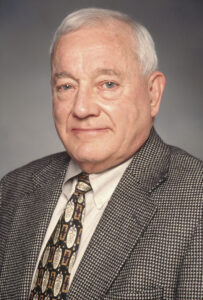Former University of Georgia Professor and Vice President for Research Joe Key passed away on Aug. 29 at the age of 90, leaving behind an immense legacy of leadership, stewardship, and discovery at UGA and beyond.
A longtime plant sciences researcher at various institutions, Key arrived at UGA in 1969, drawn by then-President Fred Davison’s commitment to building the research enterprise of a land-grant university. In the 31 years between his arrival and retirement in 2000, Key played significant roles in scientific discovery, faculty expansion in genetics and molecular plant biology, improvements to seed grants improving funding opportunities for researchers, establishment of the UGA Plant Center and Complex Carbohydrate Research Center, and much more.
“Joe Key was vice president for research when I first arrived at UGA, and I’m grateful for the opportunity to have experienced firsthand his tireless efforts on behalf of the research community,” said Chris King, interim vice president for research. “This university has made tremendous strides as a research institution, and so much of it can be traced back to the vision he had for what UGA could become. Everyone involved in the UGA research enterprise today benefits from that vision and Dr. Key’s work to make it reality.”
Key grew up in Obion County, Tennessee, and earned his undergraduate degree in agriculture from the University of Tennessee-Martin before beginning his research career in plant biology at the University of Illinois. He completed his doctoral degree there and began a National Science Foundation postdoctoral fellowship at the University of California-Davis in 1960. Within six months, he earned an appointment as an assistant professor in botany.
In 1962, he moved to Purdue University to become an associate professor. There, he explored the roles of nucleic acids in auxin-regulated responses, publishing papers in prestigious publications like Nature, Plant Physiology, Journal of Molecular Biology, and Proceedings of the National Academy of Sciences. He was recognized for the discovery of “DNA-like RNA,” now known to constitute messenger RNA in plants — crucial molecules that carry genetic information for protein synthesis.
Once at UGA, Key’s lab became a magnet for young scientists interested in plant physiology. He and his collaborators made important discoveries on a range of topics, including new understanding of protein synthetic responses to environmental changes.
Beyond his research contributions, he became an administrational leader shortly into his tenure at UGA. He chaired the Division of Biological Sciences from 1972-83, overseeing an expansion in genetics and molecular plant biology faculty. Away from UGA, he was instrumental in convincing the U.S. Department of Agriculture (USDA) to request Congressional funding for what became the USDA Competitive Research Grants Office, resulting in additional funding for plant biology research. He also served as the new office’s first scientific director.
“Joe was an exceptional scientist, a community builder, a policy shaper, and a visionary leader,” said C.J. Tsai, Winfred N. “Hank” Haynes Professor in the Franklin College of Arts and Sciences Department of Genetics and Georgia Research Alliance Eminent Scholar. “I am a beneficiary of Joe’s forward-looking vision, starting my faculty career with a grant from the USDA competitive grants program.”
In 1985, Key became UGA’s vice president for research. During his tenure, he created seed funding opportunities that allowed researchers to advance ideas to a point where they could compete for external support. He worked to improve funding for the humanities and, in the late 1980s, worked with colleague Leon Dure to establish the Plant Center, fostering interaction between labs doing molecular and biochemical research in the plant sciences.
“I moved to UGA attracted by the vibrant plant sciences community long after Joe had retired,” Tsai said. “The thriving Plant Center and the many excellent plant biologists around the globe with UGA roots are all testament to the lasting Key legacy that we will cherish.”
Now in its 30th year, Plant Center-affiliated faculty have developed more than 40 new plant varieties and held more than 15 utility patents covering plant-related technologies.
“Joe Key was a prime architect of UGA’s transition to a research-intensive university,” said David Lee, Vice President for Research Emeritus. “Among other contributions, he helped lay the foundation for today’s impressive strength in the molecular plant sciences at UGA, and he had a leading role in recruiting what became the Complex Carbohydrate Research Center. He left a big imprint on this community.”
“[He] was a pillar of strength for research at UGA for many years,” said Al Darvill, CCRC director emeritus and Regents’ Professor Emeritus. “It was Joe who attracted [CCRC co-founder] Peter Albersheim and me to look at UGA as a home for CCRC in the early 1980s. He then made sure we moved our research team to UGA and successfully got the center started with his usual vision, energy, and determination.”
In 2000, Key received the Charles Reid Barnes Lifetime Membership Award from the American Society of Plant Biologists and the Adolph E. Gude, Jr., Award in 2016.
“The University of Georgia’s record-breaking growth in research and scholarship is a testament to Joe Key’s many years of remarkable leadership,” said UGA President Jere W. Morehead. “Joe positively impacted countless lives, both here at the University of Georgia and across the nation, and his legacy as a distinguished scientist and administrator will long be remembered on our campus.”
A service to celebrate Key’s life will be held 2 p.m. Sunday, Sept. 22, at the State Botanical Garden Chapel in Athens, Ga. Family has requested that, in lieu of flowers, donations may be made to the Joe L. Key Endowment Fund at the University of Georgia to support graduate education in the plant sciences and maintain his legacy in research excellence.








